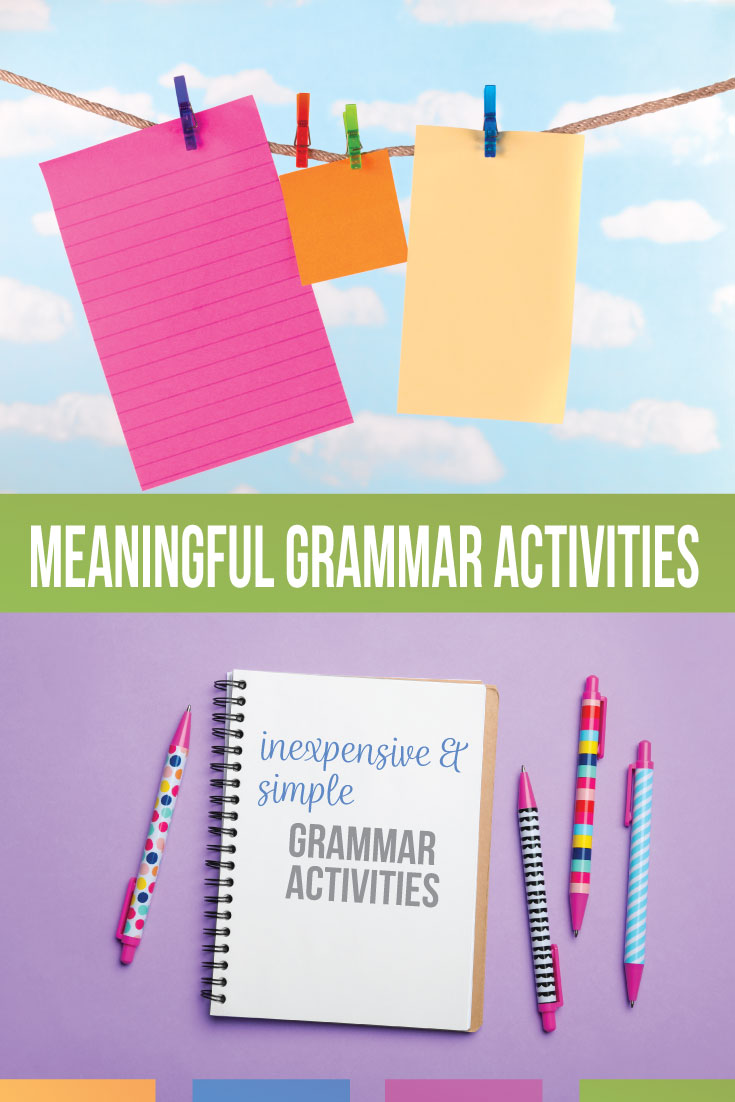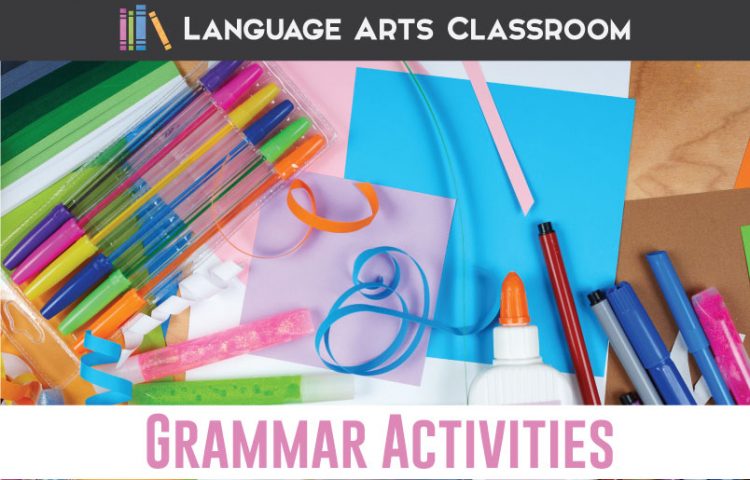Looking for grammar activities that won’t cost you any money? Seriously. You can create these grammar hunts with your trash or extra activities.
A grammar hunt is simply when you search for a grammar concept in a piece of literature, an advertisement, a piece of nonfiction, a speech, or any other use of language.
After you and your students learn about a grammar concept and hunt it down, you then ask analytical questions about the effect of the word choice, the verbs used, the sentence structure, or inversion. You can also create writing assignments from the hunts.
I like to go on a “grammar hunt” because hunts cost little money, I can assign different students different concepts (differentiation), and students enjoy these activities. These activities greatly lend themselves to partner or group work. Plus, a grammar hunt is an activity that allows the teacher to elevate student thinking as students grasp basic concepts. The material provides authentic tools for students to analyze, and questions often come naturally once students point out unique language.
If you need questions to get started with grammar hunts, you can download (for free) the activities I use to elevate grammar lessons. You absolutely can use these methods with grammar hunts, but you’ll be able to use them with other grammar lessons as well.

Grammar hunts are perfect to review before a test, to close a unit, or to practice a difficult concept. When I set up grammar stations, one is normally a grammar hunt. Sometimes, I write different grammar concepts on pieces of paper and ask students to draw what concept they’ll study.
Basically, the method you and your students work through is flexible. You can also study any grammar concept with a grammar hunt.
Now that you understand the basic premise of a grammar hunt, you need to decide where to find the material. For me, locating material is the largest obstacle in using grammar hunts. This post aims to help you find material.
The options are unlimited, but I normally choose from literature, student writing, nonfiction, or individual words.
Here are some successful tools for designing grammar hunts with your students.

Hunt from Literature
Use: any short story, picture book, or novel. Decide on a section students will peruse.
Create partnerships and give each set 7- 10 note cards. You can assign the entire class to find adjectives or whatever grammar concept you are studying. (Let’s use adjectives as an example, but you can substitute verbs or anything.) Not only will you be reviewing the story as you discuss or define the adjectives, but the students also will be invested because they chose the direction of review.
Give students ten minutes to find adjectives. If the story is longer, I ask for a page number so we can see the adjective in context. After the ten minutes, collect the cards. You can use all of the cards for discussion, or ask students to choose their favorite cards to give you.
During review, the words can easily become vocabulary lessons. You could also model dictionary use. Finally, if enough students chose the same adjectives, ask students to define the words on the back or draw a picture that interprets the word.
I love, love to go on a hunt while studying literature because so often, it can be tied to literary device. Show students how language and literary analysis is applicable to shorts stories and novels. Look at specific quotes that influence setting or move the plot.
Finally, if you have picture books or young adult books available, you can complete a one-pager hunting for strong words. Picture books contain amazing and diverse language, and taking a second look at these “children’s” books can inspire older students and give them an opportunity to add new words to their writing. Plus, no matter what books you use, you’ll be getting literature into the hands of your students.
Hunt from Student Writing
Use: student writing.
Analyzing student writing really puts grammar directly into students’ lives. You can hunt for verb voice, sentence structure, or transition words. The hunt can review a strength or a weakness in student writing.
For instance, looking at student writing works incredibly well when students are “hunting” for verbs because if a student’s writing has weak verbs, that becomes apparent. Using student writing as the base for grammar activities shows students the direct applications of concepts and rules.
However, if students are hunting for diverse conjunctions, students might realize they use a variety and encourage their peers in using a variety.
Hunt from Nonfiction
Use: any nonfiction article.
You can also use nonfiction to “hunt” for a concept. I typically do this as an extension activity for nonfiction readings. Students will hunt for words associated with arguments or facts from the article.
Then, you can analyze the tone associated with different words that convey the paper’s meaning. You can even ask if an author uses certain words when discussing different sides of the argument. I’ve made charts for each argument and had students analyze the language in a visual way.
Typically with informational texts, I can make a strong grammar to writing connection with active and passive voice. Most writing is in active voice. I teach students to pay particular attention to passive voice.
Hunt Creative Writing
Use: vocabulary, student writing, or any activity that has adjectives. Students will then write a collaborative piece.
If students have an awesome list of adjectives or if they are struggling with a vocabulary assignment, I will turn the hunt into a creative writing assignment. Students will complete a graphic organizer for the hunt of adjectives.
Then, students will practice writing the adjectives on decorative squares. Students will write the adjective, and then use the adjectives for creating stories, writing sentences, defining adjectives, or evaluating adjective use.
Display the graphic organizer or decorative squares on a bulletin board, mobile, or word wall.
Hunt Individual Words
Use: individual words.
Find old books, magazines, newspapers (anything with sentences) and put them in small containers or baggies. Ask students to hunt for the grammar concept. To differentiate, cut out the pieces for students and have them find the words. To further differentiate, highlight the chosen word in each sentence and have them label it. They can be sorted or glued.
What normally happens is students question that words can be used different ways. (Excellent discussions!) For instance, “run” can take different forms. This realization can easily become a quick writing assignment using words in different ways. (I run every day, I am going on a run.)
Finally, pull all your junk mail. I use junk mail for a variety of purposes in my class. Often, I have correct grammar mistakes. Sometimes, they model correct grammar usage for difficult to find examples.
Younger students do well finding basic concepts, like proper and common nouns.
Sometimes, I bring in a pile of magazines or advertisements for these grammar activities. You can increase student buy-in by asking them to bring in pieces from home. (Black out addresses.)
I hope that these ideas inspire you when creating your grammar activities!
Grammar activities can be made from any component of an ELA class, especially if you hunt for them. These ideas work across ages, and you can use them in casual class discussions or as a rotation in grammar stations.

